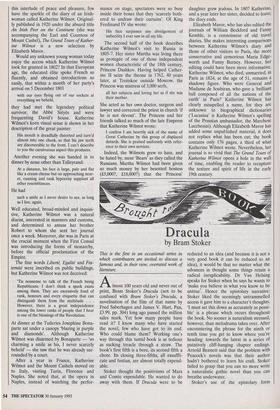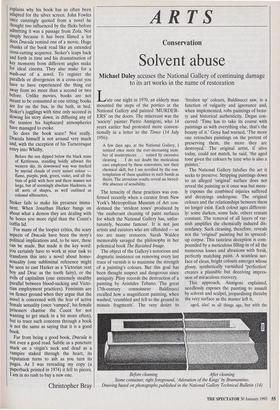Dracula
by Bram Stoker
This is the first in an occasional series in which contributors are invited to discuss a famous and, in their view, overrated work of literature.
A Imost 100 years old and never out of print, Bram Stoker's Dracula (not to be confused with Bram Stoker's Dracula, a novelisation of the film of that name by Fred Saberhagen and James V. Hart, Pan, £3.99, pp. 304) long ago passed the million sales mark. Yet how many people have read it? I know many who have started the novel, few who have got to its end. Who could blame them? Working one's way through this tumid book is as tedious as sucking treacle through a straw. The book's first fifth is a bore, its second fifth a chore. Its closing three-fifths, all exsuffli- cate and fustian, arc almost totally expend- able.
Stoker thought the positivisms of Marx and Comte expendable. He wanted to do away with them. If Dracula were to be reduced to an idea (and because it is not a very good book it can be reduced to an idea), it would be that no matter what the advances in thought some things retain a radical inexplicability. Dr Van Helsing speaks for Stoker when he says he wants to `make you believe in what you know to be untrue'. Hence the epistolary narrative: Stoker liked the seemingly untrammelled access it gave him to a character's thoughts. `I must set this down as accurately as possi- ble' is a phrase which recurs throughout the book. No sooner is naturalism stressed, however, than melodrama takes over. After encountering the phrase for the ninth or tenth time you get to know where you're heading: towards the latest in a series of putatively cliff-hanging chapter endings. Arnold Bennett said that the problem with Peacock's novels was that their author hadn't bothered to learn his craft. Stoker failed to grasp that you can no more write a naturalistic gothic novel than you can breathe underwater.
Stoker's use of the epistolary form explains why his book has so often been adapted for the silver screen. John Fowles once cunningly quoted from a novel he thought too influenced by the flicks before admitting it was a passage from Zola. Not simply because it has been filmed a lot does Dracula remind one of a movie. Huge chunks of the book read like an extended cross-cutting sequence. Stoker's leaps back and forth in time and his dramatisation of key moments from different angles make for ideal cinema. They also make for a wash-out of a novel. To register the parallels or divergences in a cross-cut you have to have experienced the thing cut away from no more than a second or two before. Unlike movies, books are not meant to be consumed at one sitting; books are for on the bus, in the bath, in bed. Stoker's jugglings with time only succeed in slowing his story down, in diffusing any of the tension his haphazard atmospherics have managed to evoke.
So does the book scare? Not really. Dracula himself is not around very much and, with the exception of his Turneresque entry into Whitby, Before the sun dipped below the black mass of Kettleness, standing boldly athwart the western sky, its downward way was marked by myriad clouds of every sunset colour flame, purple, pink, green, violet, and all the tints of gold; with here and there masses not large, but of seemingly absolute blackness, in all sorts of shapes, as well outlined as colossal silhouettes, Stoker fails to make his presence imma- nent. When Jonathan Harker bangs on about what a demon they are dealing with he bores you more rigid than the Count's coffin lid.
For many of the loopier critics, the scary aspects of Dracula have been the story's political implications and, to be sure, these can be made. But made is the key word: You certainly have to work at your task to transform this into a novel about homo- sexuality (one subliminal reference might be seen to cast Harker as a Victorian rent boy and Drac as the tooth fairy), or the evils of capitalism (one extremely stealthy parallel between blood-sucking and Victo- rian employment practices). Feminists are on firmer ground when they argue that the novel is concerned with the fear of active female sexuality (once 'vamped', his female prisoners chastise the Count for not wanting to get stuck in a bit more often), but to trace such concerns through a book is not the same as saying that it is a good book.
Far from being a good book, Dracula is not even a good read. Subtle as a puncture mark on a virgin's neck and dead as a vampire staked through the heart, its reputation turns to ash as you turn its pages. As I was rereading my copy (a Paperback printed in 1974) it fell to pieces. I am in no rush to buy a new one.
Christopher Bray











































































 Previous page
Previous page